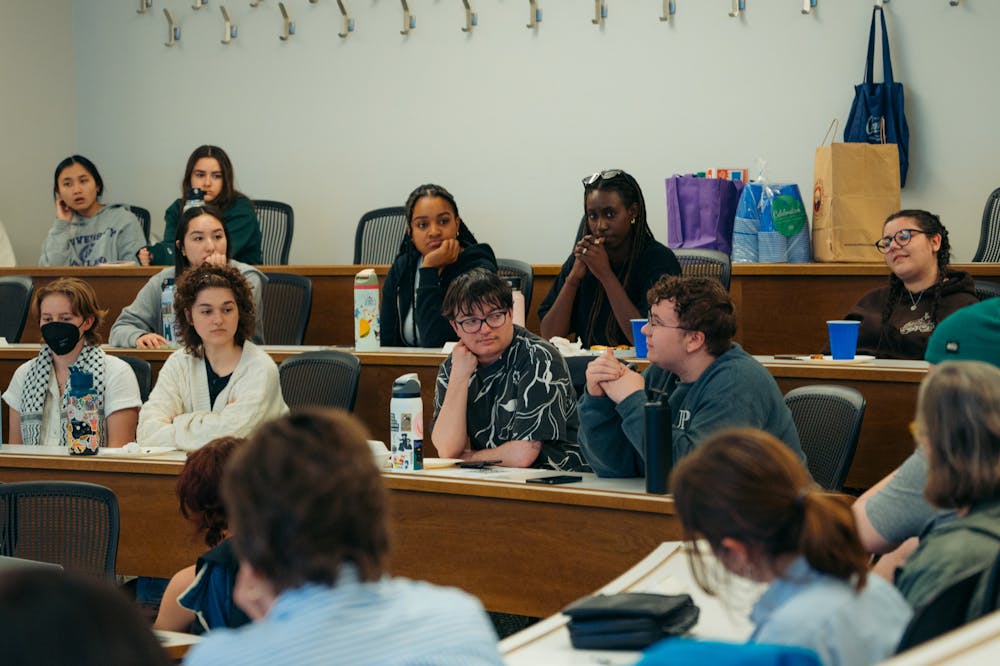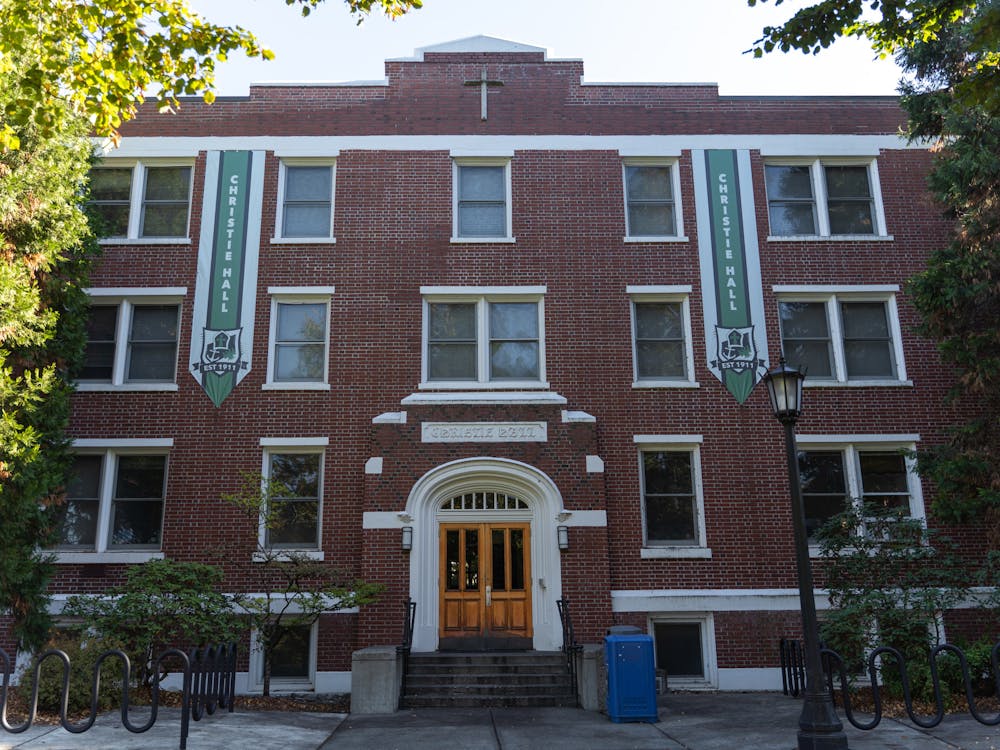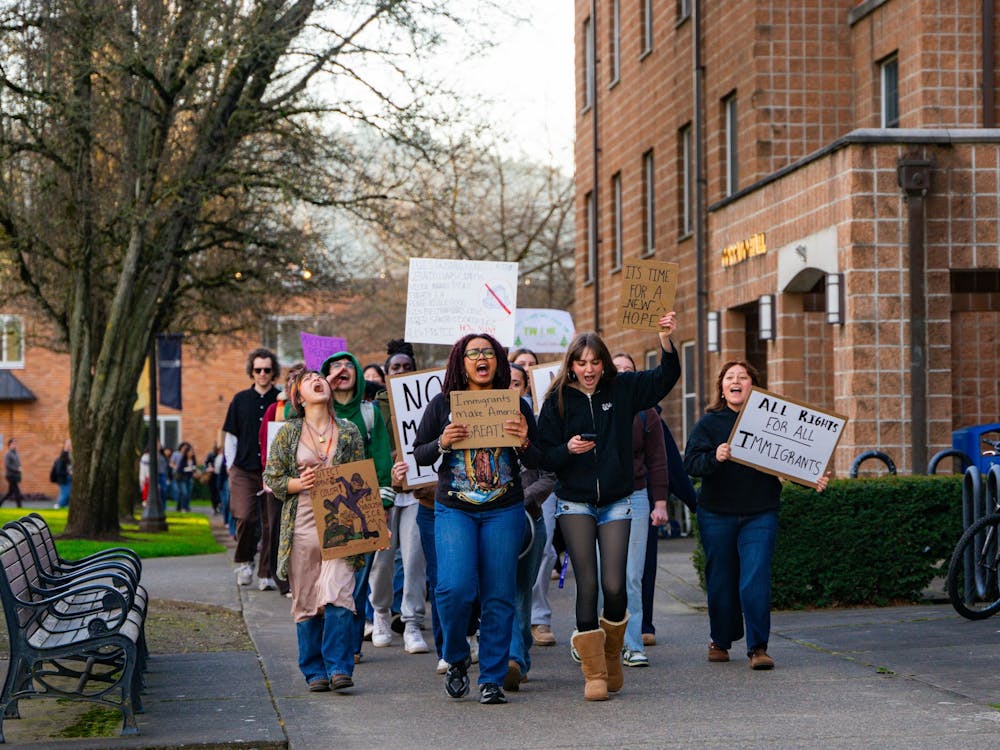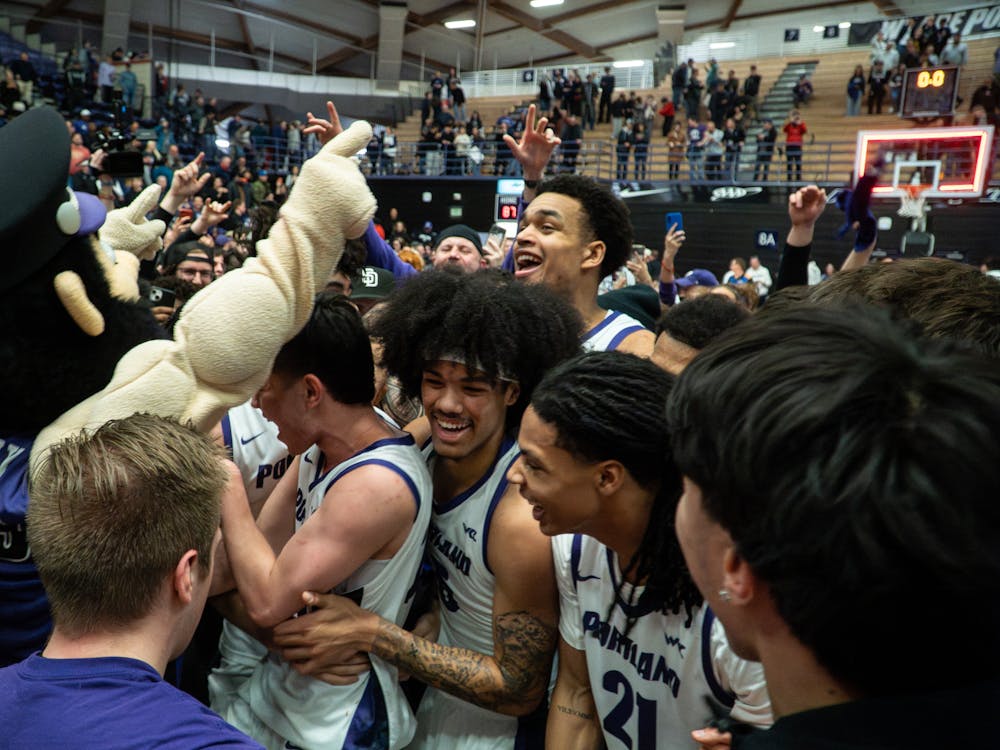Upon arrival to classroom 31 in the basement of Dundon-Berchtold Hall, you were met with the wafting scent of the vegan pizza and the sweet sounds of reggae music. However, if you would have entered that same classroom one hour later, you would’ve been met with tension.
But as Director and Professor of ethnic studies Amy Ongiri reminded members of the crowd, “There should be tension, we’re talking about life.”
On Wednesday, April 17, the Gender and Women’s Sexuality Studies (GWSS) department, in collaboration with the Ethnic Studies department, hosted a Reproductive Justice Talk that featured three keynote speakers: Ongiri, who is also a member of the GWSS department, professor Jeff Gauthier from the Philosophy and GWSS departments and professor Vail Fletcher from the Communication and Media and GWSS departments.
Amongst a crowd of students and faculty from the University of Portland also sat Gregory Kirschen. Kirschen is in the process of completing his four-year residency as an OBGYN at John Hopkins University, where he is specializing in high-risk pregnancies.
Taking place nearly a month after the on-campus club, Voice for Life, hosted Secular Pro-Life speaker Monica Snyder, the Reproductive Justice Talk was advertised as a roundtable discussion open to all UP students and faculty.
The event is detailed as follows.
Professor Jeff Gauthier: “Law, Politics and Philosophy: Abortion after Dobbs”

The first speaker, professor Jeff Gauthier discusses various supreme court cases that relate to reproductive rights.
Gauthier was the first to present his work on reproductive justice, a topic he addressed through a philosophical lens. He began with a disclaimer.
“If one is opposed to abortion, one should be doing everything they can to prevent the cause of abortion — unwanted pregnancy,” Gauthier said. “Preventing unwanted pregnancy involves education, availability to contraception and sexual assault and rape — the less sexual assaults and rapes, the less unwanted pregnancies.”
Gauthier then went on to highlight what he believes to be the three most crucial legal decisions within the debate of reproductive rights: Roe v. Wade (1973), which legalized abortion, Planned Parenthood v. Casey (1992), which affirmed the Roe decision and, most recently, Dobbs v. Jackson (2022), which overturned Roe.
Gauthier pointed to a recent Pew study, which showed that 62% of Americans support legal access to abortion, despite the Dobbs ruling.
“One of the strange things about U.S. law, or I should say the U.S. political system, is so many of our decisions come from courts, as opposed to the democratic process,” Gauthier said. “Basically because we have a broken-down democratic process.”
Gauthier highlighted what conversations about reproductive justice legal decisions often leave out: the ethical and philosophical dilemma that criminalizing abortion poses for women.
“The idea that you have a battle between a fetus and the person carrying the fetus is a very strange way to think about pregnancy,” Gauthier said.
Due to the 10-minute time constraint that was put on each presenter, he was cut short, but not before providing the crowd with what he described as a summary of the rest of his presentation.
“The law has a very difficult time dealing with things that don’t happen to straight white men,” Gauthier said. “And that’s all I have time for, but trust me, I have a lot more to say.”
Professor Amy Ongiri: “Reproductive Rights are Civil Rights”

Ongiri introduced their section of the presentation in regards to the relevance abortion rights provides to their area of work, ethnic studies.
“You might be asking yourself, ‘Why does ethnic studies care about reproductive justice?’” Ongiri said. “Well, because ethnic studies is foundationally concerned with bodily autonomy.”
Ongiri presented the audience with a detailed timeline of a history of Civil Rights legislation in the U.S. It included the Civil Rights Act (1964), Voting Rights Act (1965), the Supreme Court decision that gave married women access to contraception (1965) and the Equal Credit Opportunity Act of 1974, which granted women the right to a bank account and credit card in their own name.
“You’ll notice what’s not up there is Roe v. Wade. Roe v. Wade isn’t up there because it’s gone,” Ongiri said. “And this [history] is where we are headed back to if we start chipping away at these rights.”
Ongiri would later describe further implications and barriers that are faced by Black women in America’s healthcare system.
Ongiri also discussed their experience as a foster parent. With four children of their own, Ongiri deconstructed the mythology that exists around the foster care system and how it further perpetuates racism.
“There’s a term: unadoptable,” Ongiri said. “And that age for [being] unadoptable is really young. It is also racially demarcated, so you’re unadoptable much younger if you’re Black. That age is usually two for Black babies, and for white babies it’s five.”
Ongiri left the crowd on a slide with a quote that read: “Pro-life would be 20 Sandy Hook students graduating high school next month.”

Professor Vail Fletcher: “Your Body is a Battleground”
Fletcher’s presentation focused on her personal experiences as a woman living in America in the post-Dobbs decision era.
“I’m in this real free fall of despair about where we are right now in this country around abortion rights,” Fletcher said. “I feel angry and I feel betrayed — I feel betrayed by this country.”
She began with a story that left a profound impression on her as a teenager.
“I was in high school in the 1990s in upstate New York,” Fletcher said. “Directly across the street from me lived an abortion provider. He was coming home from the synagogue, walked into his house and, in front of his four children, was assassinated for being an abortion provider.”
She has found herself reflecting on it more since the overturn of Roe in 2022.
“The overturning of Roe shaped a whole new era of my thinking about what it means to get up every day in a democracy and fight for your rights,” Fletcher said. “And I really do feel your body is a battleground.
Fletcher’s main point: abortion is healthcare.
“Abortion is healthcare,” Fletcher said. “I have a reproductive system, I get checked for STIs, I get pap smears, I get pregnancy tests and I have a private, protected conversation with a medical professional about what I need for my health care — my reproductive health. And that's a really sacred thing.”
For Fletcher, being able to stand at the front of a classroom and discuss a topic she’s passionate about was a monumental moment for her.
“There are a lot of faculty on this campus that have felt silenced, particularly around this topic,” Fletcher said. “I am actually fairly shocked at how silenced I’ve let myself be here at the University of Portland. It’s taken 14 years for me to get up here and say this stuff.”
A Physician’s Perspective
At the conclusion of the presentations from professors Ongiri, Gauthier and Fletcher, the presenters turned to Kirschen. He reflected on his firsthand experience of how limited abortion access has been detrimental to his patients’ mental health.
“I personally provide abortions in my practice and that is something I hope to continue doing legally,” Kirschen said. “It’s been frustrating as an OBGYN because we’re just trying to do our jobs and we are trying to help patients who are in their greatest time of need. And I will say there is nothing worse than a patient who is trying to get an abortion for their mental health and can’t.”
Q&A
The floor was opened up for the general Q&A portion of the event, which sparked an environment for sharing personal stories and reflections.
Fr. Charlie McCoy, adviser of the Voice for Life student group, posed a question to Kirschen. He referenced The Turnaway Study, a research project that examined the effects of unwanted pregnancy on women’s lives.
The study concluded that receiving an abortion does not harm the health and well-being of women, but being denied an abortion results in worse financial, health and family outcomes.
Also noted was the resulting mental health outcomes that both women who received and women who were denied abortions faced. The study found that in both instances, there was an increase in mental health and well-being from the time they sought the abortion to five years after.
“So one thing you had said is that there is nothing worse for a person’s mental health than carrying a pregnancy that they didn’t want,” McCoy said. “How does that square with The Turnaway Study that basically said there was no difference in mental health outcomes between women who wanted abortions and women who were denied abortions that they wanted?”
This immediately sparked a flurry of commotion of students and professors pulling out their phones and chatting with people nearby as they pulled up the study themselves.
“I can’t say I’m familiar with that study in particular,” Kirschen said. “But I can tell you from my experience dealing with women on a daily basis that we have women coming in who had been denied abortions in their home state and it is traumatizing for them.”
The microphone could not be passed around the room quickly enough as the room buzzed in response to McCoy’s question.
The mic ended up in the hands of a student who redirected the conversation.
“We need to move away from the conversation of The Turnaway Study,” one student said. “We’re here talking about people who can carry babies and them not having the right to do that. I don’t think we should be listening to a white man quoting a study.”
Many of the hands that were up around the room were lowered in response before the student continued on with detailing her experience of navigating the healthcare system as a Black woman in America.
Ongiri took over the mic in response.
“It [the Dobbs decision] creates a horrible situation for Black women who are already extremely suffering through the healthcare system,” Ongiri said. “The states that are overturning abortion are very Black, so this is impacting Black women in the extreme.”
As conversations began to wrap up, the speakers of the event gave parting statements to the audience, Ongiri with one in particular for McCoy.
“I think it takes courage to be in a room with your collar,” Ongiri said. “We all know your position. I don’t know your heart, but I know you represent the Catholic Church and I think it takes some courage to come here, and I appreciate you being here.”
It was Fletcher who had the final words, hers regarding the continued fight for abortion access.
“You're here, and you're ready for this,” Fletcher said. “And I know it's not fun, and it's scary and it's disorienting, it's a lot of whiteness and that is just a huge part of all of these things. I appreciate that you're here and supporting us and we want to support you back. I feel like my head is gonna hit the pillow tonight and I’m going to feel very comforted and hopeful.”
Emma Swett is a sports reporter for The Beacon and can be reached at swett25@up.edu.








